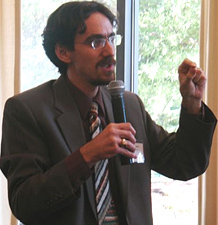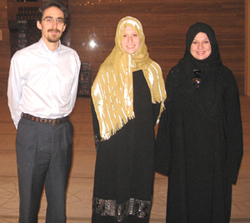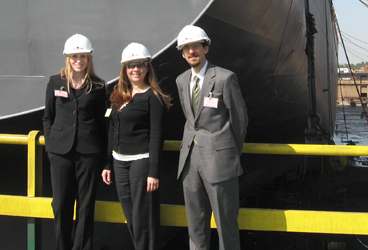Alumni Spotlight: Eugene Gholz

Degree: Ph.D. in Political Science, 2000
Dissertation: Getting Subsidies Right: Government Support to High-Tech Industry
Current Position: Associate Professor of Public Affairs, Lyndon B. Johnson School of Public Affairs, The University of Texas at Austin
Recent Publications:
Peter Dombrowski and Eugene Gholz, Identifying Disruptive Innovation: Innovation Theory and the Defense Industry, Innovations, Vol. 4, No. 2, Spring 2009.
Eugene Gholz and Daryl G. Press, “All the Oil We Need,” New York Times, August 21, 2008
Harvey M. Sapolsky, Eugene Gholz, and Caitlin Talmadge, U.S. Defense Politics: The Origins of Security Policy (Routledge 2008)
Eugene Gholz, "Globalization, Systems Integration, and the Future of Great Power War," Security Studies, Vol. 16, No. 4 (Winter 2007-08), pp. 615-36
Peter J. Dombrowski and Eugene Gholz, Buying Military Transformation: Technological Innovation and the Defense Industry (Columbia University Press 2006)
1. You are working on questions related to energy security. Can you give us a glimpse into what you are discovering?
When the price of oil was really high in 2008, politicians of every stripe – following the script of every president since Richard Nixon – declared their support for "energy independence" and fiercely debated who was more committed to protecting American energy security.
Greens have joined in, too, because they see a potential coalition that might support a major energy policy overhaul to address climate change and energy security at the same time. But the good rhetoric is usually pretty vague on how energy connects to national security, how the U.S. should address potential threats, or even what the potential threats are. And the academic literature on energy security offers shockingly little help. For example, neither International Security nor Security Studies has published an article on energy security in more than a decade, although many articles mention "energy" or "oil" in passing.
I have been trying to sort out "big questions" about how energy fits into national security strategy, but I am also drawn to "in the weeds" questions. On the big questions, I frequently work with Dartmouth College professor (and fellow SSP grad) Daryl Press. We started by considering how the global oil market responds to shocks – the sort of acute crises like a war in the Middle East that immediately attract attention from the national security community. In on-going academic work, we are finding that a fairly simple model of the cartel behavior accounts pretty well for responses to supply disruptions, and the striking implication is that the global oil market is more robust than most people's intuitions would lead them to believe: the market itself responds to most shocks and "protects" American energy security by restoring the pre-disruption level of supply after just a few months. The real questions are which shocks would overwhelm the market mechanisms and in what ways military policies can help respond to those specific, overwhelming shocks. Only a few scenarios – such as the collapse of Saudi production during a civil war – would be big enough, and current American military deployments seem more likely to exacerbate rather than ameliorate the risk of that scenario. Daryl and I have published a policy-oriented paper based on these results, along with analysis of other energy security issues like "peak oil" and China's policy to expand access to foreign oil supplies (http://www.cato.org/pub_display.php?pub_id=8161). We hope academic article(s) will come soon.
 2. What about your “in the weeds” work?
2. What about your “in the weeds” work?
I have been studying the threat of a major disruption in the Strait of Hormuz – specifically, using the sort of campaign analysis that I learned as a student at SSP to assess Iran's ability to "close the Strait." Iran threatens to close the Strait more or less whenever they feel threatened by the U.S. How much credibility should we assign their threats? My friend and co-author (and current SSP graduate student) Caitlin Talmadge published a really good campaign analysis of the challenges that a U.S. effort to re-open the Strait would face, but she more or less assumed that the scenario would start with a successful Iranian disruption of world oil supplies. I think Caitlin is right that current U.S. policy would lead almost immediately to a military response, escalating any crisis in the Strait; in fact, the U.S. has seemed almost to lean into an Iranian punch in the series of incidents with Iranian speedboats in the Strait over the past couple of years. That's unfortunate, because the U.S. intervention would be painful for all concerned.
But if U.S. policy were to change to a more patient one – one where we would "wait and see" for a brief time to find out how much damage the Iranians could actually do to oil flows – we might well discover real limits to Iranian capability, even if they used modern mines, anti-ship cruise missiles, suicide speedboats, and other forms of attack. In the 1980s, when Iraq and Iran targeted tanker traffic, the U.S. reacted patiently, and the world found that tanker traffic is highly resilient. Oil continued to flow, and in the end it was not energy security but Cold War competition with the Soviets that drew the U.S. Navy to reflag Kuwaiti tankers and start convoys in 1987 (years after attacks on tankers began). Over the past couple of years, I have worked with a team of graduate students to try to understand how tanker captains, insurance underwriters, and other key participants in the global oil supply chain might react to attacks. The key has been connecting military-technical analysis and political-economy analysis of the oil market. Based on historical data from the 1980s and more recent incidents like the terrorist attack on the French tanker M/V Limburg, I have calibrated models that I hope are generally accurate (if not precise) to predict the level of disruption from various Iranian attack scenarios. And even using very conservative assumptions, it is hard to find a scenario in which the Iranians can disrupt enough oil flow to overwhelm the market's adaptation. The bigger risk is that the U.S. will escalate a crisis too fast.
 3. You have done substantial work in the past on the defense industry in the U.S. and Europe, on its adaptation to the end of the Cold War, and on its contribution to military innovation. The Obama administration has announced some major changes in acquisition plans, and acquisition reform is back on the policy agenda. Where is this all going?
3. You have done substantial work in the past on the defense industry in the U.S. and Europe, on its adaptation to the end of the Cold War, and on its contribution to military innovation. The Obama administration has announced some major changes in acquisition plans, and acquisition reform is back on the policy agenda. Where is this all going?
I'm very sympathetic to the goal of cutting back substantially on the acquisition of some of the big, expensive legacy systems that the U.S. is currently buying. In the 1990s and early-2000s, the acquisition community became intoxicated with the idea that systems integration could get good enough to manage incredibly complex projects like the Army’s Future Combat Systems. The teams that worked together on these mega-projects, organized by Lead Systems Integrator contractors, also marshaled tremendous political support: on FCS for example, Boeing joined the core group supporting Army acquisition, supplementing the traditional stalwarts like United Defense (now owned by BAe Systems) and General Dynamics. Of course, the projects are too complex for even the best-intentioned, best-staffed systems integration efforts. The question is whether the politics can overcome the performance problems to keep the money flowing.
Politics pretty much won out in the 1990s: the Clinton administration wanted a "peace dividend," but pork barrel politics severely limited its ability to cut the defense budget. The rate of cuts in defense outlays from the peak of the Reagan build-up to the trough of post-Cold War spending was the slowest downswing of the post-World War II budget cycles. In the Cold War, national security needs often trumped pork barrel politics, because politicians were susceptible to the argument that we needed to adjust spending to meet the Soviet threat. It's hard to make a similar case today, without a peer competitor.
Secretary of Defense Robert Gates argues that we need to adjust the defense budget to fight the on-going wars in Iraq and Afghanistan. People can see why we might need to buy more Mine-Resistant Ambush-Protected vehicles or how we should adapt MRAP transmissions to shift them from the relatively flat terrain of Iraq to the mountainous terrain of Afghanistan. But Afghanistan and the war on terror don't offer much guidance for most major systems acquisitions – whether we should keep trying for really high-end next-generation satellite constellations or whether we should buy "interim," technically simpler solutions.
4. You earned your Ph.D. in 2000 and quickly established yourself as a scholar, first at the University of Kentucky and now at the University of Texas at Austin. In retrospect, which experiences at SSP were particularly helpful to you as you launched your academic career?
The close collaboration with faculty mentors and fellow students through the SSP working groups had a tremendous effect on my academic career. (I worked closely with Harvey Sapolsky in the working group on the defense industry, and I was part of Barry Posen's conventional forces group). Big working group projects sometimes can distract graduate students from their main job (getting their dissertations done), and I guess such distractions will always be with me: I like to juggle multiple projects, and as a result sometimes they may take longer than they should. But the benefit on the other side is huge for me: Collaboration makes the final products much better, and I learned that collaborative work style at SSP.
The Wednesday seminar series, regular interaction with military fellows, and a number of working group field trips also firmly grounded my scholarly interests in real-world questions. SSP offers an environment in which students can learn the practical side of security studies. That influenced my research agenda and my instincts for how to answer questions. And of course that preparation naturally drew me into a career teaching in policy schools, where the whole idea is to try to connect theory and practice.
5. You have taught at two public policy schools. MIT has no public policy school. How does teaching at such a school differ from teaching in conventional undergraduate or graduate programs?
I have never taught in a traditional disciplinary department, so I don't have direct experience to make the comparison. The one undergraduate class that I regularly teach is a self-consciously inter-disciplinary "introduction to international studies" where the idea of the class is to spur students' interest and enthusiasm in the subject rather than in a particular disciplinary approach. In addition to my own contribution to that course, each week I bring a guest speaker from a different discipline to give students an idea of the different approaches (political science, history, economics, sociology, law, regional planning, etc.). Part of the reason that I chair UT's interdisciplinary undergraduate international studies certificate program (we don't have an undergraduate major yet) is that the policy school environment has conditioned me to view the world in an interdisciplinary way.
But my main job is teaching in a master's program in a professional school. Almost all of our students go directly to jobs in government, with NGOs, or in the private sector; very few go on to Ph.D. programs. That means that the courses always try to present theory not as an end but as a means of helping to frame the kinds of questions that come up in policy decision-making or policy advocacy or entrepreneurship. I deal with IR theory as part of the editorial team at Security Studies, where I get my share of theory submissions to shepherd through the review and decision process. So I stay "in touch" with theory, but it's clear that my policy school environment pulls me towards certain kinds of research and teaching and away from others. And emphasizing systematic analysis of policy-driven questions rather than high-level theory is clearly a good fit for my interests and my personality.

